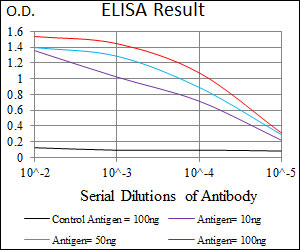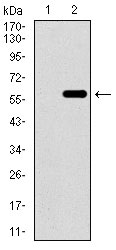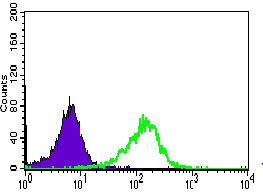WDR66 Antibody
Purified Mouse Monoclonal Antibody
- SPECIFICATION
- CITATIONS
- PROTOCOLS
- BACKGROUND

Application
| WB, FC, E |
|---|---|
| Primary Accession | Q8TBY9 |
| Reactivity | Human |
| Host | Mouse |
| Clonality | Monoclonal |
| Clone Names | 2A6F7 |
| Isotype | IgG1 |
| Calculated MW | 130kDa |
| Description | This protein encoded by this gene belongs to the WD repeat-containing family of proteins, which function in the formation of protein-protein complexes in a variety of biological pathways. This family member appears to function in the determination of mean platelet volume (MPV), and polymorphisms in this gene have been associated with variance in MPV. Alternative splicing of this gene results in multiple transcript variants. |
| Immunogen | Purified recombinant fragment of human WDR66 (AA: 1-250) expressed in E. Coli. |
| Formulation | Purified antibody in PBS with 0.05% sodium azide |
| Gene ID | 144406 |
|---|---|
| Other Names | WD repeat-containing protein 66, WDR66 |
| Dilution | E~~1/10000 WB~~1/500 - 1/2000 FC~~1/200 - 1/400 |
| Storage | Maintain refrigerated at 2-8°C for up to 6 months. For long term storage store at -20°C in small aliquots to prevent freeze-thaw cycles. |
| Precautions | WDR66 Antibody is for research use only and not for use in diagnostic or therapeutic procedures. |
| Name | CFAP251 (HGNC:28506) |
|---|---|
| Function | Involved in spermatozoa motility (PubMed:30122540, PubMed:30122541). May also regulate cilium motility through its role in the assembly of the axonemal radial spokes (By similarity). |
| Cellular Location | Cytoplasm, cytoskeleton, cilium axoneme {ECO:0000250|UniProtKB:A8IRK7}. Cell projection, cilium, flagellum |
| Tissue Location | Isoform 1 is highly expressed in testis and, at lower levels, in lung. Very low levels are detected in kidney and brain (PubMed:30122540). In testis, expressed in spermatozoa (at protein level) (PubMed:30122540, PubMed:30122541). Isoform 2 is not detected in testis, lung, kidney, nor in brain (PubMed:30122540) |

Thousands of laboratories across the world have published research that depended on the performance of antibodies from Abcepta to advance their research. Check out links to articles that cite our products in major peer-reviewed journals, organized by research category.
info@abcepta.com, and receive a free "I Love Antibodies" mug.
Provided below are standard protocols that you may find useful for product applications.
Background
The protein encoded by this gene is a member of the MAP kinase family. MAP kinases act as an integration point for multiple biochemical signals, and are involved in a wide variety of cellular processes such as proliferation, differentiation, transcription regulation and development. This kinase is activated by various environmental stresses and proinflammatory cytokines. The activation requires its phosphorylation by MAP kinase kinases (MKKs), or its autophosphorylation triggered by the interaction of MAP3K7IP1/TAB1 protein with this kinase. The substrates of this kinase include transcription regulator ATF2, MEF2C, and MAX, cell cycle regulator CDC25B, and tumor suppressor p53, which suggest the roles of this kinase in stress related transcription and cell cycle regulation, as well as in genotoxic stress response. Four alternatively spliced transcript variants of this gene encoding distinct isoforms have been reported. ;
References
1. J Genet. 2012 Feb 29;91(1):e1-e11. 2. Cell Mol Life Sci. 2001 Dec;58(14):2085-97.
If you have used an Abcepta product and would like to share how it has performed, please click on the "Submit Review" button and provide the requested information. Our staff will examine and post your review and contact you if needed.
If you have any additional inquiries please email technical services at tech@abcepta.com.













 Foundational characteristics of cancer include proliferation, angiogenesis, migration, evasion of apoptosis, and cellular immortality. Find key markers for these cellular processes and antibodies to detect them.
Foundational characteristics of cancer include proliferation, angiogenesis, migration, evasion of apoptosis, and cellular immortality. Find key markers for these cellular processes and antibodies to detect them. The SUMOplot™ Analysis Program predicts and scores sumoylation sites in your protein. SUMOylation is a post-translational modification involved in various cellular processes, such as nuclear-cytosolic transport, transcriptional regulation, apoptosis, protein stability, response to stress, and progression through the cell cycle.
The SUMOplot™ Analysis Program predicts and scores sumoylation sites in your protein. SUMOylation is a post-translational modification involved in various cellular processes, such as nuclear-cytosolic transport, transcriptional regulation, apoptosis, protein stability, response to stress, and progression through the cell cycle. The Autophagy Receptor Motif Plotter predicts and scores autophagy receptor binding sites in your protein. Identifying proteins connected to this pathway is critical to understanding the role of autophagy in physiological as well as pathological processes such as development, differentiation, neurodegenerative diseases, stress, infection, and cancer.
The Autophagy Receptor Motif Plotter predicts and scores autophagy receptor binding sites in your protein. Identifying proteins connected to this pathway is critical to understanding the role of autophagy in physiological as well as pathological processes such as development, differentiation, neurodegenerative diseases, stress, infection, and cancer.





